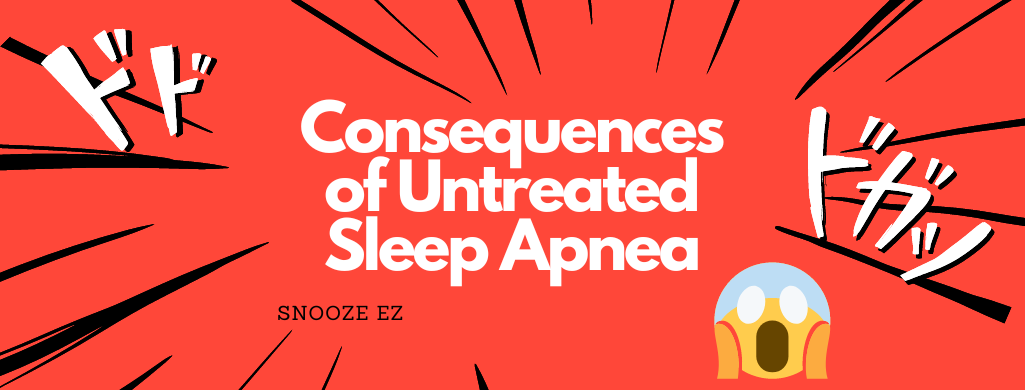Lack of oxygen to the brain and heart over time can cause major health problems.
Do you snore loudly or experience sudden awakenings during sleep? These could be signs of obstructive sleep apnea (OSA), a common sleep disorder. If left untreated, what consequences could it have on your health?
Sleep apnea is a very common sleep disorder and often goes undiagnosed. It’s a condition where your breathing repeatedly stops and starts during sleep, leading to disrupted sleep patterns and other health problems.
Sleep apnea is a serious condition that can have a significant impact on your overall health, from increased risk of heart disease to impaired cognitive function. In this article, we’ll explore the consequences of leaving sleep apnea untreated and why seeking treatment is crucial for your well-being.
What happens if you don’t treat sleep apnea?
If left untreated, sleep apnea can cause a variety of health problems. Due to the lack of oxygen being provided to your heart and brain night after night, sleep apnea takes a toll on your body over time. People with sleep apnea are at an increased risk of developing high blood pressure, heart attack, heart arrhythmia, stroke, and diabetes.
In addition to this, they are also more likely to experience memory loss, difficulty concentrating and focusing, as well as depression and anxiety. Furthermore, research has shown that individuals who suffer from sleep apnea for a long period of time may be more prone to developing heart disease or even death due to cardiac complications.
Sleep deprivation caused by the inability to stay asleep due to frequent awakenings can lead to daytime fatigue and mood swings. This lack of restorative sleep can affect your ability to work and perform daily tasks. In extreme cases, it can even increase the likelihood of motor vehicle accidents.
Can you leave sleep apnea untreated?
The short answer is no. Sleep apnea is a serious condition, and leaving it untreated can lead to a range of health complications. As mentioned earlier, people with untreated sleep apnea are at a higher risk of developing all sorts of health problems. While mild cases of sleep apnea may not require medical treatment, more severe forms of the disorder need to be treated by a doctor in order to reduce the risk of long-term health problems.
In some cases, lifestyle changes such as weight loss, avoiding alcohol and smoking as well as using a special breathing device during sleep can help improve symptoms of sleep apnea. However, for individuals with more severe forms of the disorder, such lifestyle modifications will likely not be enough and professional intervention is necessary.
Does sleep apnea get worse over time?
Yes, sleep apnea can get worse over time. This is generally due to 3 factors.
- Weight Gain – You are more likely to gain more weight with untreated sleep apnea due to the hormone disruption that it causes. The hormone called Leptin is usually deficient in people with sleep apnea and this hormone helps control weight. The more weight you gain, the higher risk that the obstruction get worse.
- Age – As you age, chances of sleep apnea are higher due to the same reasons that can make it worse. As we age our throat muscles tend to lose tone, and relax more, causing obstruction.
- Health Conditions – And as mentioned before, over time you are more likely to have health conditions that arise due to untreated sleep apnea and these health conditions can make sleep apnea symptoms worse.
How dangerous is sleep apnea if not treated?
Sleep apnea is very dangerous and should not be taken lightly. If you are thinking of taking your chances, then please think again. Untreated sleep apnea is expected to reduce life expectancy by 12-15 years on average. You have a 30% higher risk of developing a serious health problem or having a heart attack or stroke. And lastly, according to an American Academy Sleep Medicine, you are 3x more likely to die earlier than your life expectancy.
If you are experiencing any symptoms such as loud snoring, gasping during sleep, or sudden awakenings, it is important to consult a doctor to rule out the possibility of sleep apnea by having a sleep study and seek treatment if necessary.
Why should you seek treatment?
Treating sleep apnea is essential to ensure your overall health and wellbeing. People live normal, healthy lives with treated sleep apnea, and in some studies, damage as a result has been reversed. Seeking medical help can help treat the condition, reduce symptoms, and improve your quality of life.
Treatment options vary depending on the severity of your condition, but typically include lifestyle changes such as losing weight, avoiding alcohol and caffeine before bedtime, and sleeping in an elevated position. Your doctor may also recommend using a Continuous Positive Airway Pressure (CPAP) machine that helps keep your airways open during sleep or even surgery for more severe cases.
Conclusion
Sleep apnea is a serious condition that can lead to severe health complications if untreated. Fortunately, with proper diagnosis and treatment, it can be managed and some complications can even be reversed.
Lifestyle changes such as weight loss and avoiding alcohol and caffeine before bedtime are important first steps to managing mild sleep apnea, but for more severe cases, medical intervention is necessary. Doctors can recommend the most suitable treatments for you based on the severity of your condition, so seeking medical help is essential to ensure your overall health and wellbeing.


